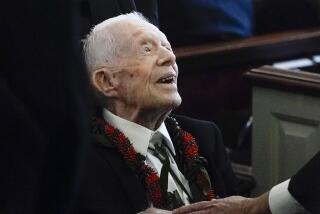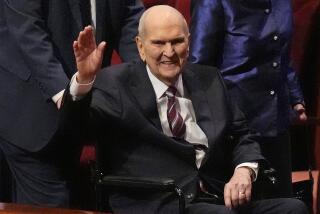Just a number?
- Share via
IN BRITAIN, FROM WHICH THIS country severed all “political bands” in 1776, the birthday of the monarch is a cause for national celebration. Not even the most ardent advocate of the unitary executive would suggest that Americans attach the same importance to a president’s birthday. So why was there so much fascination with George W. Bush’s attainment of three-score years?
Not only did this event generate a plethora of news stories, PR geniuses also cleverly piggybacked on the media coverage. We were especially impressed by Nintendo’s decision to provide the president with a cognition-honing game called Brain Age that, among other things, allows players to solve “simple math problems” (no fuzzy math, presumably) and count the number of people going in and out of a house.
Explanations abound for the focus on Bush’s 60th. One is that he is the first baby-boomer president to turn 60 on the job (Bill Clinton, 60 next month, was 54 when he left office). The Bush-as-boomer angle has served as a springboard for yet further journalistic reflection on that over-analyzed generation.
Bush’s 60th also provides a peg for the inevitable observations about how the presidency ages its occupants, as well as speculation about whether the graying at the president’s temples was accelerated by Sept. 11 or the war in Iraq. Yet we think something else is going on here. Bush’s 60th is good copy for the same reason Mick Jagger’s was: It represents the aging of a youthful persona.
Younger men than Bush have served as president -- Teddy Roosevelt and John F. Kennedy were in their 40s when they were inaugurated -- but this president is known for a number of traits associated with youthfulness: his informality, his fondness for goofy nicknames, his habit of bantering with the media (which backfired recently when he kidded a reporter for this newspaper at a Rose Garden event about wearing dark glasses required by an eye condition).
Years ago, Michael Kinsley quipped that Al Gore was an old person’s idea of a young person. Bush’s brashness and playfulness -- what critics call his “frat boy” persona -- have put him closer to a young person’s idea of a young person. The question is whether that will change now that the “frat boy” has embarked on his seventh decade. The president took pains last month to tell some real young people that 60 was just a number.
“When I was your age, I thought 60 was really old,” Bush told some community college students. “It’s all in your mind. It’s not that old, it really isn’t.” We agree, but, given all the hoopla about this birthday, those students might have been skeptical.
More to Read
The biggest entertainment stories
Get our big stories about Hollywood, film, television, music, arts, culture and more right in your inbox as soon as they publish.
You may occasionally receive promotional content from the Los Angeles Times.










